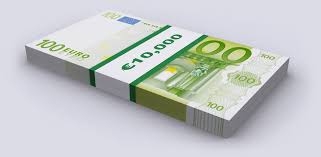Mar 6, 2014 8:35 AM PT
 “The euro is rising on Draghi’s general upbeat view,” said Gavin Friend, a foreign-exchange strategist at National Australia Bank Ltd. in London. “The notion the recovery proceeds, albeit at a slow pace and remains fragile, but is going to plan. The ECB is emboldened by last week’s turn” in inflation and bank-lending data, he said.
“The euro is rising on Draghi’s general upbeat view,” said Gavin Friend, a foreign-exchange strategist at National Australia Bank Ltd. in London. “The notion the recovery proceeds, albeit at a slow pace and remains fragile, but is going to plan. The ECB is emboldened by last week’s turn” in inflation and bank-lending data, he said.
The euro rallied to a two-month high against the dollar after European Central Bank President Mario Draghi said inflation is expected to rise gradually, damping bets policy makers will introduce further monetary stimulus.
The 18-nation currency advanced versus all except one of its 16 major counterparts as the central bank predicted economic growth will accelerate. The yen dropped to a five-week low versus the greenback after an advisory panel said Japan’s Government Pension Investment Fund no longer needs to focus on domestic bonds. Australia’s dollar strengthened for a fourth day after retail sales climbed and the trade surplus expanded.
The euro gained 0.8 percent to $1.3847 at 11:29 p.m. in New York after rising to $1.3857, the highest level since Dec. 27. The shared currency jumped 1.6 percent to 142.71 yen, the biggest advance since Sept. 19. The yen slid 0.7 percent to 103.05 per dollar after tumbling to 103.17, the weakest since Jan. 29.
EM Strength
A custom Bloomberg index of the 20 most-traded emerging-market currencies rose 0.6 percent, its biggest gain in more than a month, to its highest level since Jan. 14.
The Indian rupee gained versus the majority of its 24 most-traded emerging-market peers after a report showed the nation’s current-account deficit shrank to the smallest in four years. The currency appreciated 1 percent to 61.115 per dollar after rising 1.1 percent to 61.105, the strongest since Dec. 10.
Hungary’s forint and Poland’s zloty were also among the biggest emerging-market currency gainers, climbing 1.1 percent and 1 percent.
The Russian ruble retreated as speculation political tension in Ukraine may deepen curbed appetite for the nations’ assets. Crimea’s parliament voted to become a part of Russia and the region will hold a referendum March 16 on whether to remain part of Ukraine, according to a statement on its website. The currency fell 0.1 percent to 36.1270 per dollar after earlier slipping 0.6 percent.
‘Hidden Treasure’
“The weak ruble is probably the best thing that could happen for the Russian economy,” David Woo, the New York-based head of global rates and currencies at Bank of America Corp., said in an interview on Bloomberg Television’s “Surveillance” with Tom Keene and Adam Johnson. “That’s probably the hidden treasure from this crisis.”
Australia’s dollar extended its daily winning streak to the longest since December after the Bureau of Statistics said exports exceeded imports by A$1.43 billion ($1.3 billion) in January, the most since August 2011. Retail sales increased 1.2 percent.
“The improving global economy is, of course, always supportive of the Australian dollar so you can include that in the basket of reasons for why the Aussie has got some tactical upside momentum,” said Richard Grace, chief currency and rates strategist at Commonwealth Bank of Australia in Sydney.
The Aussie jumped 1.1 percent to 90.86 U.S. cents.
Central Bank
The ECB left its benchmark interest rate at 0.25 percent at its monthly meeting in Frankfurt as forecast by 40 out of 54 economists surveyed by Bloomberg News. The other 14 were predicting a rate cut.
Euro-area inflation, which was at 0.8 percent in February, will accelerate to 1.7 percent in the fourth quarter of 2016, Draghi said at a press conference in Frankfurt after the decision. Consumer prices will rise 1 percent this year, he said. ECB officials see inflation at 1.3 percent in 2015 and an average rate of 1.5 percent in 2016, he said.
Draghi also said he saw no need to halt the absorption of liquidity created by bond purchases under the ECB’s now defunct Securities Markets Program. He also said the exchange rate was not a policy target. Additional stimulus measures tend to weaken a currency.
The euro strengthened 7 percent during the past 12 months, the third best performer of 10 developed-nation currencies tracked by Bloomberg Correlation-Weighted Indexes. The dollar fell 0.5 percent and the yen slumped 10.1 percent.
The yen fell against all of its 16 major peers as a draft report from the committee formed to help the health ministry decide on investment targets for the 128.6 trillion-yen government investment fund said it should seek yearly returns of 1.7 percent plus the rate of pay increases for workers.
The yen also weakened amid speculation tensions surrounding Ukraine will ease, reducing demand for haven assets.
“The advisory panel has been arguing for some time that the government needs to push the GPIF away from JGB investments,” said Derek Halpenny, European head of global markets research at Bank of Tokyo-Mitsubishi UFJ Ltd. in London, referring to Japanese government bonds. “The general tone of the markets is one of favoring risk appetite and that’s helping to weaken the yen.”
To contact the reporters on this story: Neal Armstrong in London at narmstrong8@bloomberg.net; Joseph Ciolli in New York at jciolli@bloomberg.net
To contact the editor responsible for this story: Dave Liedtka at dliedtka@bloomberg.net